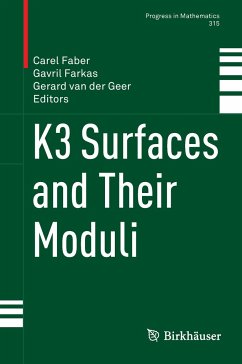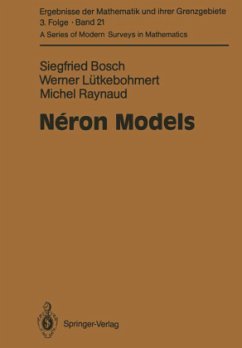
Mordell-Weil Lattices
Versandkostenfrei!
Versandfertig in 6-10 Tagen
106,99 €
inkl. MwSt.
Weitere Ausgaben:

PAYBACK Punkte
53 °P sammeln!
This book lays out the theory of Mordell-Weil lattices, a very powerful and influential tool at the crossroads of algebraic geometry and number theory, which offers many fruitful connections to other areas of mathematics.The book presents all the ingredients entering into the theory of Mordell-Weil lattices in detail, notably, relevant portions of lattice theory, elliptic curves, and algebraic surfaces. After defining Mordell-Weil lattices, the authors provide several applications in depth. They start with the classification of rational elliptic surfaces. Then a useful connection with Galois r...
This book lays out the theory of Mordell-Weil lattices, a very powerful and influential tool at the crossroads of algebraic geometry and number theory, which offers many fruitful connections to other areas of mathematics.
The book presents all the ingredients entering into the theory of Mordell-Weil lattices in detail, notably, relevant portions of lattice theory, elliptic curves, and algebraic surfaces. After defining Mordell-Weil lattices, the authors provide several applications in depth. They start with the classification of rational elliptic surfaces. Then a useful connection with Galois representations is discussed. By developing the notion of excellent families, the authors are able to design many Galois representations with given Galois groups such as the Weyl groups of E6, E7 and E8. They also explain a connection to the classical topic of the 27 lines on a cubic surface.
Two chapters deal withelliptic K3 surfaces, a pulsating area of recent research activity which highlights many central properties of Mordell-Weil lattices. Finally, the book turns to the rank problem-one of the key motivations for the introduction of Mordell-Weil lattices. The authors present the state of the art of the rank problem for elliptic curves both over Q and over C(t) and work out applications to the sphere packing problem.
Throughout, the book includes many instructive examples illustrating the theory.
The book presents all the ingredients entering into the theory of Mordell-Weil lattices in detail, notably, relevant portions of lattice theory, elliptic curves, and algebraic surfaces. After defining Mordell-Weil lattices, the authors provide several applications in depth. They start with the classification of rational elliptic surfaces. Then a useful connection with Galois representations is discussed. By developing the notion of excellent families, the authors are able to design many Galois representations with given Galois groups such as the Weyl groups of E6, E7 and E8. They also explain a connection to the classical topic of the 27 lines on a cubic surface.
Two chapters deal withelliptic K3 surfaces, a pulsating area of recent research activity which highlights many central properties of Mordell-Weil lattices. Finally, the book turns to the rank problem-one of the key motivations for the introduction of Mordell-Weil lattices. The authors present the state of the art of the rank problem for elliptic curves both over Q and over C(t) and work out applications to the sphere packing problem.
Throughout, the book includes many instructive examples illustrating the theory.























